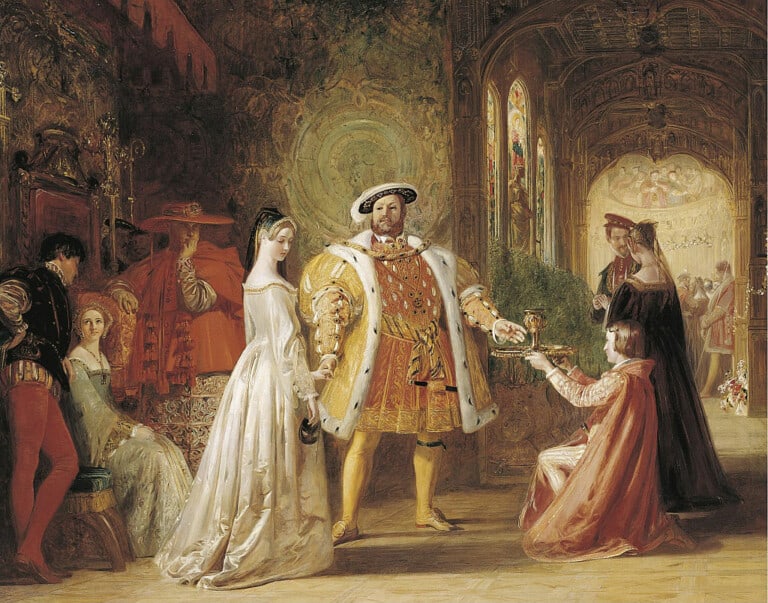The Anglo-American World is predominantly a Protestant and religious world: reformed Christianity largely influenced the culture and ideals.
But Protestantism is no British creation for it appeared in the 16th century in continental Europe.
A German monk called Martin Luther started a rebellion against the churches’ authority in 1517 and founded a new church: “the Lutheran or Evangelical Church”.
A Frenchman called Jean Calvin rose against authority and influenced indirectly the whole civilization of the English-speaking world.
For them, the only authority in the church should come from the Bible and not from priests, or else the interpretation is open to everybody: the Reformation started a real challenge against authority.
English and American Protestantism were defined by plurality: the Reformation had a tremendous influence on individual freedom and the development of an atmosphere of tolerance.
In Britain, churches after the Reformation organized themselves as official national churches: one particular protestant church became the established Church (rejection and exclusion).
In Ireland, the establishment was the natural elite: what was called the Ascendancy.
The Church of England
The Church of England was created by the top of British society in 1534 when Henry VIII decided to separate the English Church from the Church of Rome by his authority.
His creation took the simple name of the Anglican Church (English Church). The King had 3 main reasons for the creation of the Church of England:
1. Personal reason: The king wished to divorce his wife and the Pope refused. There was a problem of power for the King did not want to be ruled by the Pope.
2. Financial reason: England was small and poor before colonization and the King needed the Church’s wealth. Hence, the King accepted Luther’s theory about the abolition of monasteries and started the Reformation.
3. Political reason: Henry VIII wanted to be free of appointing the leaders of the church, i.e. the Bishops.
The Reformation was a declaration of independence for the rest of the world (especially for France and Italy).
In terms of doctrine, Anglicanism is a political, practical, and pragmatic compromise between Roman Catholicism and continental Protestantism: several tendencies developed within the Church from the part of the Church called High Church (close to Catholicism) to the low Church (close to Calvinism).
The Church developed a general atmosphere of tolerance. Yet, in terms of organization and discipline, the Church of England kept an elaborate hierarchy of priests, bishops, and 2 archbishops under the supremacy of the King, the official head of the Church.
Individual access to reading the Bible, which represents a characteristic of Protestantism, was made possible through the publication in 1611 of an English translation of the texts.
But, this was made under a strictly controlled version, known after the very significant name of the authorized version, which is in use nowadays in the USA: King James’s Bible.
From 1563, those who wanted to eliminate catholic survivors from the Church of England were forced to leave it: they were called the Puritans from their wish to purify the Church from popery.
They gave birth to England’s religious pluralism that found an echo in a variety of American churches’ denominations.
The Church of Scotland
In 1559, John Knox founded a popular Calvinist church in Scotland. He rejected papal authority and all kinds of hierarchy but this democratic church imposed strict moral discipline and social order on the people.
It was organized after a system called Presbyterianism in which authority was detained neither by people nor ministers but by a category of members called the Elders.
In 1560, the Scottish Parliament adopted Presbyterianism as the Church of Scotland.
The non-established churches
Contrary to the notions of uniformity and discipline, expressed by the established churches (England and Scotland), the existence and persistence of non-established denominations demonstrate the principles of diversity which is characteristic of the protestant world.
Historically, both Catholic and Protestant dissenters were first persecuted and then excluded from civic life, i.e. they had no access to professions, trading corporations, universities (both as students and professors), and politics.
Protestant independents were finally tolerated in the early 18th century but the formal emancipation of those two groups of people only took place in 182X, when they were given full civil rights.
Roman Catholicism
Because of persecutions, Roman Catholicism had almost disappeared from GB in the 18th century. But in Ireland, it remained the religion of a majority of the population.
Nevertheless, like the British counterpart, until 1829, Irish Catholics were discriminated and the minority Anglican Church was established as the official church of Ireland.
Mainly because of Irish immigration from 1845 onwards, Roman Catholicism has made constant progress in GB, particularly in the big industrial centres of the Northwest (Liverpool, Manchester, Glasgow).
In 1921, the major part of Ireland separated from Britain and became the Irish Free State, which later took the name of the Irish Republic or Eire. However, the mainly protestant countries of Northern Ireland remained British for political and religious reasons. They formed the province of Ulster.
This close link between religion and politics, between Protestantism and unionism on the one hand and Catholicism and republicanism on the other hand is the main reason for sectarian violence in Ulster.
Other problems are typical of the religious context of Northern Ireland:
- Absence of residential integration between Catholics and Protestants: the two communities live in separate quarters. This problem is responsible for the presence of ghettos in Belfast or Derry.
- Persistence of job discrimination for the catholic minority in Northern Ireland. Although discrimination was formerly declared illegal in 1979, many of the jobless in Northern Ireland are Catholics.
Other protestant denominations
Several denominations continue to be in the independent tradition that emerged in England and Scotland against the established churches:
The Congregationalists: emerged as the old Puritan separatists. In England and Wales, they have recently merged with the Presbyterians to become the united-reformed church. But this union was impossible in Scotland, where Presbyterianism is established as the official church.
The Baptists: were created in England in 1609 by John Smyth. Their action is very important in the USA (especially in the South). Famous Baptists: Martin Luther King, Billy Graham, Jimmy Carter.
The Quakers: were founded by the Englishman George Fox in 1650. They have no clergy at all and advocate pacifism (peace and love). Their influence is very important in charities and education. They played a decisive role in business and capitalism: Barclay founded an important banking company and Cadbury a chocolate company. The Quakers also founded two American states: Pennsylvania and Rhode Island, both famous for their religious tolerance and democratic institutions.
The Methodists: were created by an Englishman called John Wesley in the middle of the 18th century. Methodism started as a protest against conservatism and formalism in the Church of England. Popular movement insisting on individual freedom and personal enthusiasm.
The Salvation Army: was founded by an Englishman called William Booth in 1865 in a very original protestant church without clergy, yet with a strong military organization. The church insists on the relief of poverty as essential.
The influence of Protestantism
Protestantism and more especially Bible reading in English represent the major origins of the Anglo-American moral and intellectual traditions. It greatly influenced native traditions but it was also influenced by those different traditions.
The result of these interactions, sometimes violent, is a complex cultural melting pot that is characteristic of the contemporary English-speaking world.
Influence on politics and economics
Protestantism advocated individual freedom and more democracy in Church matters. The Anglo-American tradition emphasizes on the notion of respect for civic liberties and insists on the necessity for minimum intervention from the state in everyday life.
Therefore, both libertarianism and liberalism may be said to be the consequence of Protestantism. Parliamentary institutions were first adopted in England before the Reformation but the progressive desacralization of monarchy and the rule of pluralism through the creation of political parties are legacies of Protestantism.
The coexistence between centralism and delegation of authority was inherited from Protestantism. In Britain, the monarchy persisted as the symbol of the state. In the USA, the new presidential institutions emphasized a powerful head of state.
But in both cases, local authorities have their say in political matters. The American regime is federal while the British system applies the rule of subsidiarity; i.e. decisions are taken at the lowest possible level.
Capitalism may also be attributed to Protestantism since economic success and accumulation of capital were considered signs of salvation.
Influence on culture and society
Because of the emphasis put on the individual by Protestantism, Anglo-American societies are strongly individualistic. They expressed the horror of collective structure, the cult of the self-made man and are very often indifferent to poverty.
Society is also animated by a strong sense of community, in great respect for the organization, responsibility, and public spirit.
Sometimes, the state is committed to social issues: the Welfare State in GB was set up in 1945 to protect national health and social security but there is no Welfare State in the USA.
Hence, the opposition of a Puritan sense of economy, seriousness, and work ethic, is counterbalanced by a degree of relativism, distanced humour and nonsense, which are as powerful as the Puritan trend.
Because of its religious diversity, the Anglo-American World inherited a great sense of compromise in a general context of striking social and cultural contrast.
Synopsis » From the Reformation to the birth of the American nation (1534-1776)
- The Reformation in the British Isles
- English Expansionism
- The Glorious Revolution of 1688
- The American colonies : Religion and Politics
- USA: Birth of a Nation



good to remember the interesting history of the US
Lollards and non-academic instances are also a factor in the English contribution of the Reformation. It is important that we note the State as a needed apparatus for the Church. Thus when foreign contributions are set aside we have room for an Arminian aspect. Even though many wanted Arminians to be equated with Catholic spiritual lawlessness, the Catholics are not Arminian. Although Calvinist and Lutheran points are not without merit. Also we Anglicans have an unmatched libertarian streak and have made–in the form of the stewardship and the Great Commission by way of empire — social and spiritual liberty unmatched. From the Magna Carta to a lack of persecution of Anabaptists’, we have reigned by the very hand of God.